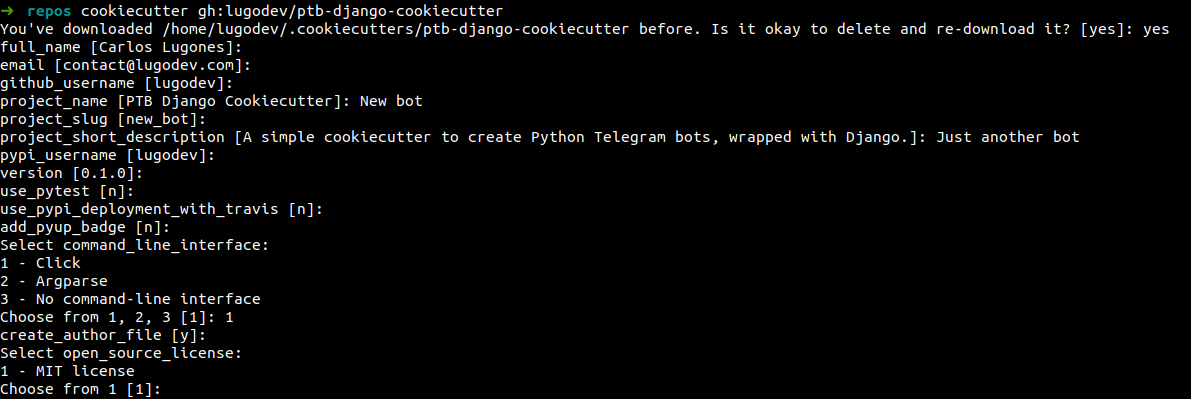PTB Django cookiecutter
A simple cookiecutter to create Python Telegram bots, wrapped with Django.
What's inside
- Django app with
devandprodenvironments. - Model to store bot users data.
- Command to run the bot.
- Admin web interface to see the bot data.
- Authentication mechanism.
- Some example callbacks.
- Small engine to wrap the bot callbacks.
- Ready for deployment using Docker via
docker-compose.
Quickstart
Install the latest Cookiecutter if you haven't installed it yet:
pip install -U cookiecutter
Create your bot using this cookiecutter:
cookiecutter gh:lugodev/ptb-django-cookiecutter
This will clone the cookiecutter and launch a wizard to help you customize your new bot.

Bot structure
Once you have generated your new bot, you will get this folders structure:
src/bot: The bot source code.core:authentication.py: The authentication mechanism.callbacks.py: Your callbacks here.commands.py: Your commands here.constants.py: Your conversation states, defined as constants.conversation.py: Your conversation callbacks.engine.py: The bot engine.messages.py: The message filter callbacks.models.py: Your bot models, defined as Django model classes.renderers.py: Methods to render your messages.
Start your bot on dev environment
 Tip (optional): Create these aliases on on your .bashrc or .zshrc, like this
alias poetry="python3 -m poetry"
alias django="poetry run ./dev.py"
alias djr="django runserver"
alias djm="django makemigrations && django migrate"
alias djmr="djm && djr"
Install the dependencies using Poetry:
curl -sSL https://raw.githubusercontent.com/python-poetry/poetry/master/get-poetry.py | python -
cd src/bot
poetry install
Place your env vars to the .env file (never push the file to the repo):
SECRET_KEY=your django random secret key
TELEGRAM_TOKEN=your bot token
Start the bot (using the alias):
django runbot
Or using Poetry:
python3 -m poetry run ./dev.py runbot
Deploy your bot
Clone your repo to the server, and create this folder structure:
codebase: The repo itself, the source code.storage: The place to store the DB and other persistant files.
Create and fill the ./codebase/.env file with the environment vars.
Then, deploy, using docker-compose:
cd codebase
docker-compose up --build -d




